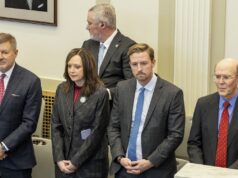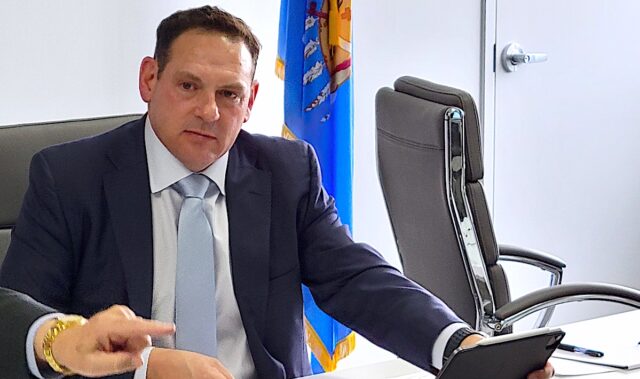

In his capacity as the appointed chairman of the Oklahoma Broadband Governing Board, Mike Fina worked closely with a Motorola lobbyist and the company’s territory vice president — Fina’s former employee and his former college roommate, respectively — to steer $20 million to the Department of Public Safety for upgrades to an antiquated Motorola radio system.
In doing so, records indicate Fina acted as an intermediary between Motorola representatives and DPS for the sole-source agreement, and he ultimately caught legislators off guard by having the public board approve $20 million of Broadband Office funding for the project Nov. 29. Over the next three weeks, Motorola Vice President Clay Cassard and Motorola lobbyist Jodi Lewis sent numerous messages about finalizing the contract to Fina, who said Dec. 5 that he was “working to get this thing funded before the end of the month.”
NonDoc requested text and email communications between Fina, Cassard and Lewis in April and received them June 13, the same day Fina says he was removed from the board by Gov. Kevin Stitt. Although the governor’s office declined to provide an explanation for the sudden removal — to NonDoc or to Fina — there is no other indication that Fina’s actions surrounding the DPS project spurred the change.
“The governor is appreciative of Mike Fina’s time serving the state, and while the search is ongoing, is optimistic a new chair will continue to uphold the governor’s commitment of ensuring all 4 million Oklahomans have access to quick and reliable broadband,” Kate Vesper, Stitt’s press secretary, said in a statement.
Fina is the second appointee Stitt has removed from the Oklahoma Broadband Governing Board, which is poised to disburse as much as $1.6 billion to internet service providers to establish high-speed internet for underserved areas of Oklahoma. In March, Stitt removed Lyle Roggow after requesting that former Rep. Mike Sanders be hired as director of the Broadband Office instead of the board’s preferred out-of-state candidate. Fina and the rest of the board acquiesced and hired Sanders.
The $20 million project — which will upgrade equipment for the 43-site Oklahoma Wireless Information Network (OKWIN) — is just the latest DPS radio communications effort awarded to Motorola Solutions. The Chicago-based company has provided radio equipment and supplies to the OKWIN system for more than 20 years, and in recent years other companies have alleged that Oklahoma has shown preference to Motorola, including a $50 million sole-source bid in 2015 that was halted after state officials questioned the selection process. The company also won two contracts funded with federal grants in 2020, including one that came in $3.4 million higher than an alternate bid, according to DPS records.
DPS officials have said Motorola equipment must be used to upgrade OKWIN because the company provided the system’s existing equipment. The geographic limitations of the OKWIN system have spurred some leading legislators to discuss the need for a true statewide radio network for law enforcement, but that concept stalled again during the past year’s drama about the $20 million upgrade to the OKWIN system.
Developing a statewide radio communication system has been talked about for decades, and technological advancements have made it possible. Committees have been formed, interim studies have been held, legislation has been filed, and pleas have been made to the governor, all to no avail.
The saga has frustrated those advocating for a true statewide radio system, including Rep. Ross Ford, a retired police officer who questions how Motorola lands sole-source state contracts and the company’s claim that its equipment is not interoperable with that of other radio providers, such as L3Harris.
“I’m looking at running some legislation that says if any taxpayers’ dollars are used for a statewide radio system, the vendors have to work together to make sure that in the future — if we go with a different vendor — the system has to work seamlessly together,” said Ford (R-Broken Arrow). “We’ve just got to make sure that we’re not picking winners and losers in the bidding process. We can’t do sole-source bidding, and that’s what we’ve done in the past, and sole-source bidding has always cost us about at least 40 to 50 percent more than what it would if you did a true bidding process.”
Motorola’s influence within DPS and Oklahoma government is illustrated by its pursuit of the $20 million radio upgrade project. With legislators initially declining to recommend federal American Rescue Plan Act funding for the effort, records and interviews indicate that Motorola representatives worked alongside state officials to get DPS the $20 million through the Oklahoma Broadband Office, which had received $382 million of ARPA money to fund high-speed internet service throughout the state.
Secretary of Public Safety Tricia Everest, who serves as the governor’s liaison to public safety agencies, said she believes DPS officials were caught off guard by the effort to dedicate $20 million from the Broadband Office to the Motorola system upgrade.
“We didn’t go to Broadband to request it,” she said. “To the best of my knowledge, we were all surprised when that came about.”
Texts show how Fina brought Motorola proposal before board
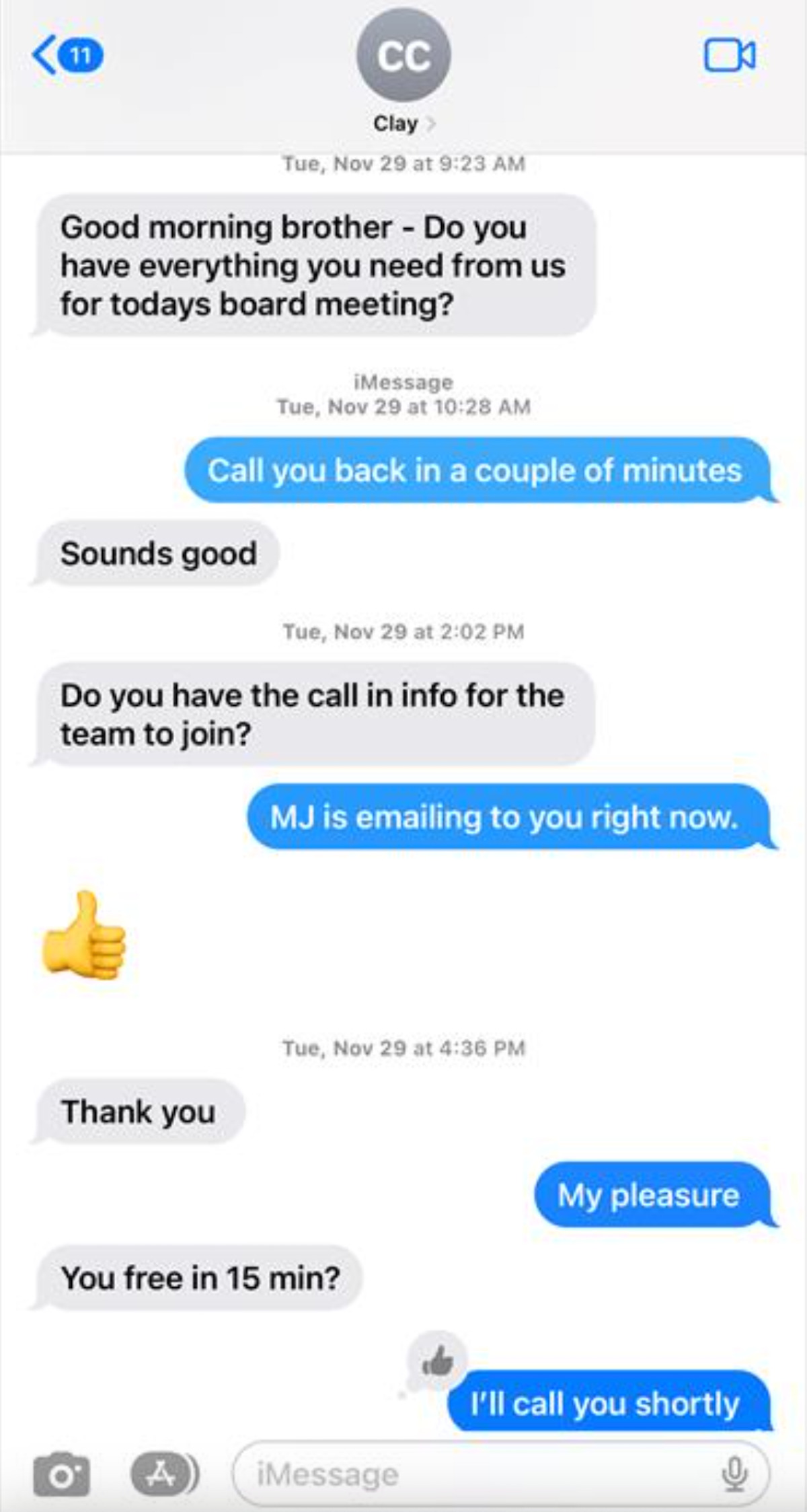
In the weeks leading up to the Oklahoma Broadband Governing Board’s Nov. 29 vote, text messages show that Chairman Mike Fina discussed the radio project closely with Motorola officials as they first tried to get a $20 million ARPA appropriation directly to DPS and as they subsequently worked to get the money from the Broadband Office.
The existing radio and camera provider for DPS, Motorola Solutions employs lobbyist Jodi Lewis, who formerly worked as legislative director for the Oklahoma Municipal League under Fina, who has been OML’s executive director since 2017. Fina’s former college roommate at Texas State University, Clay Cassard, has worked for Motorola Solutions since 2005 and was promoted to territory vice president in March 2020.
On Sept. 7, Fina texted Cassard that he had spoken with Senate Appropriations and Budget Chairman Roger Thompson (R-Okemah) about the DPS and Motorola project. (All text messages quoted in this story appear unedited in their original form.)
“You guys are not being held up at all on the ARPA funds,” Fina said. “They just haven’t approved anything yet.”
Cassard replied that he heard a consultant hired by the Legislature was saying “communications projects don’t qualify” for ARPA use, which he called “incorrect.”
“We need to get these approved this year and dont want to get dragged down in broadband, because these don’t really apply for broadband – its way more clear to be ARPA funded,” Cassard texted Fina.
Fina responded: “That’s fine whatever works for you.”
One week later, Cassard asked Fina whether Thompson had mentioned anything “about our ARPA project.”
Fina replied that he had spoken with Sen. Chuck Hall, Thompson’s appropriations vice chairman and a member of the Joint Committee on Pandemic Relief Funding.
“He said it was probably coming to my committee,” Fina said.
In an Oct. 19 text to Hall, Fina asked: “Are you still going to have us fund the Motorola project? If so, will you send us some kind of direction or do you want me to work with DPS?”
Hall (R-Perry) responded: “I don’t know that I’m ready to put a legislative intent on paper. However, I do think that you, I and (House Speaker Pro Tempore Kyle) Hilbert need to sit down soon and talk about a direction for state-wide emergency management communication systems. I have several thoughts on the subject but want you involved.”
“Sounds good,” Fina replied, “that project is really important to our municipalities so whatever we need to do to get it done just let me know and I will make it happen.”
On Nov. 9, Fina called Cassard, who did not answer but texted back that he was on a conference call. Fina responded.
“Chuck Hall just gave the go ahead to receive the proposal from DPS,” Fina said. “Would you guys arrange that? I want to hear it privately so I know what I am preparing for but then will do it in front of the board at the next meeting if we can get it moving that fast.”
“Fantastic – thank you my brother,” Cassard replied. “And yes we can arrange ASAP.”
But four months later — at a March 29 public hearing of the Legislature’s joint ARPA committee — Hall, Hilbert and other lawmakers expressed displeasure and confusion about why Fina’s Broadband Governing Board had voted Nov. 29 to send $20 million to DPS for its Motorola system.
“It comes as a surprise to me,” Hall said during the meeting. “No. 1 it doesn’t meet in any form the mission of the Broadband Council and the Broadband Board, and No. 2 the Legislature was on record through their working groups of not supporting a use of ARPA dollars for the OKWIN project.”
Ultimately, legislators and DPS officials agreed that the $20 million from the Broadband Office would not be spent on Motorola’s equipment. However, when lawmakers revealed and passed their Fiscal Year 2024 budget in May, legislative leaders had appropriated a separate $20 million to DPS for the Motorola project. Lawmakers sent DPS the money from the new Legacy Capital Financing Fund, which means DPS will repay the $20 million back to the LCFF at a rate of $1 million per year for 20 years.
In a June interview, Hall said he never told Fina the OKWIN proposal should be sent to the Broadband Governing Board for consideration. He said he believed the proposal was more in line to be funded through direct appropriation from the Legislature, which is what eventually happened.
“I’m sick about what is an obvious miscommunication from somewhere,” Hall said.
‘Getting the money to you guys before the end of the year’
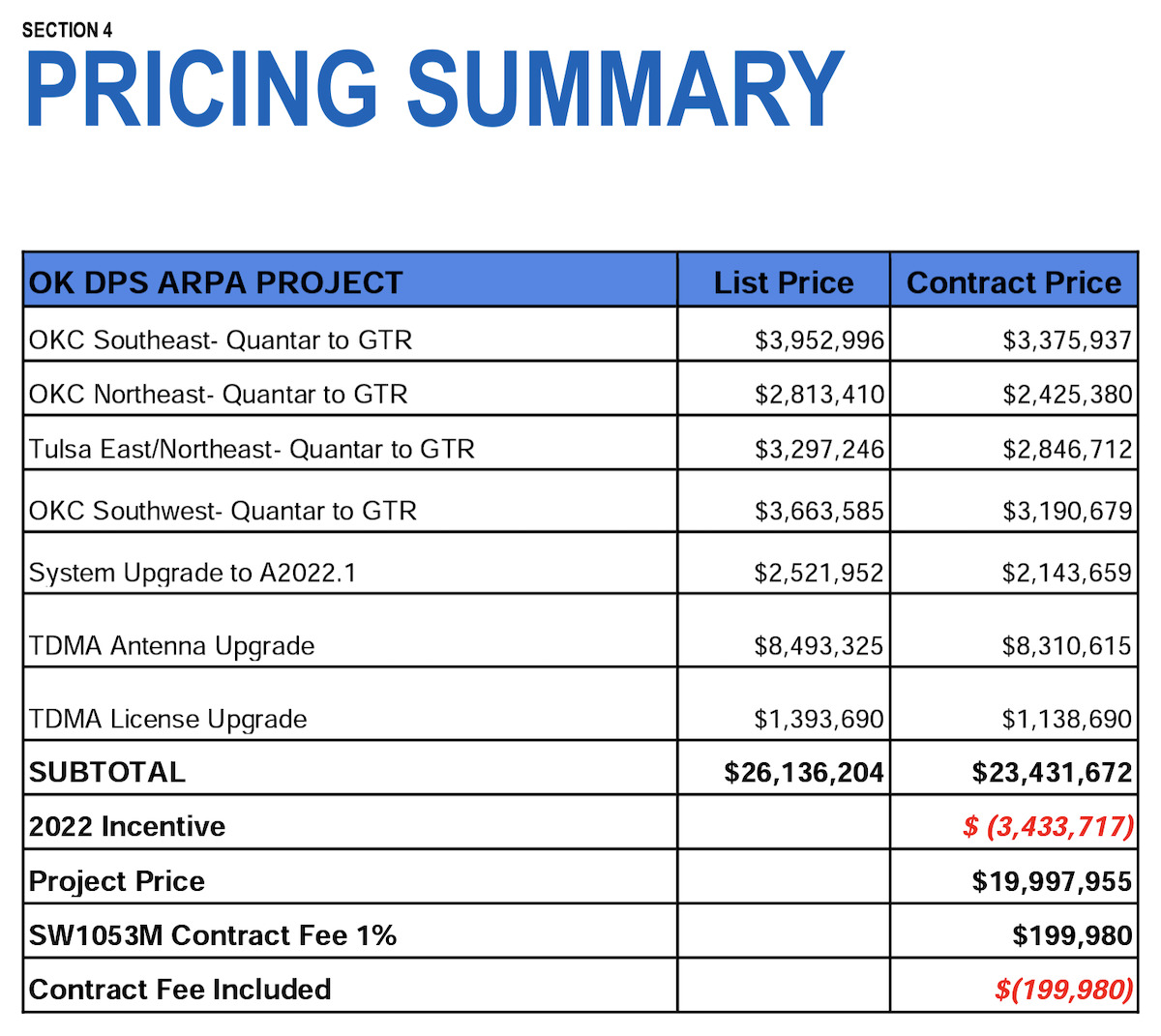
In the hours leading up to the Nov. 29 Broadband Governing Board meeting, Fina and Motorola executives were communicating heavily.
Late in the day Nov. 28, Cassard emailed Fina the project’s 43-page proposal with a “reworked” pricing page. The only people copied on the email were two other Motorola employees, including former Sen. Jason Smalley, whom the proposal labels as “account manager.”
The next morning, Cassard texted Fina, “Good morning brother – Do you have everything you need from us for todays board meeting?” Receiving no response, Cassard called Fina, who texted that he would return the call shortly.
The board’s Nov. 29 meeting minutes show unanimous approval to dedicate $20 million to the OKWIN project. The minutes also show DPS project director Nick Carraro joining the call to discuss the proposal. Motorola representatives were watching the meeting stream as well.
After the motion to approve funding but before the meeting had adjourned, Cassard texted Fina, “Thank you.”
“My pleasure,” Fina responded.
After the meeting, Fina sent a text to Hall: “Dps project was approved tonight at our meeting.”
“Okay,” Hall replied. “Thx.”
Hall told NonDoc he was surprised to receive the text from Fina, saying he did not know the OKWIN project was even on the Broadband Governing Board’s agenda.
“It was a surprise to me,” he said. “I now know — at least I think — what that was all about, which is that people are out there saying somehow I wanted the OKWIN system funded out of the broadband dollars, which I have never in my life said anything like that.”
Hall said he had told DPS to consider submitting the OKWIN project to the legislative working group looking at the expenditure of ARPA funds given to the state for possible broadband use. He said his comment might have been misinterpreted as wanting the project submitted to the Broadband Governing Board.
“I think this is a classic case of miscommunication,” Hall said. “[Fina] may have legitimately thought that my desire was for this to be funded through the Broadband [Office].”
Still, other legislators were unaware that the Broadband Governing Board would be voting to use $20 million of its ARPA funds on the OKWIN project, and they did not know Fina was collaborating with a pair of friends who worked for Motorola to get the DPS proposal before the board.
“When I heard about it and what it’s going for, it really caught me off guard,” Ford said. “A radio system is not broadband. How did that happen?”
On Nov. 22, a week before the Broadband Governing Board meeting, Fina sent a text to Lewis, the Motorola lobbyist who had previously worked for him at OML.
“Can you guys reach out to DPS and see if they could go through the project with me on Monday?” Fina wrote. “I’m going to include it as an agenda item for our meeting next Tuesday. If I can get the project details by then I will vote on it next week. if not, we want to prove (sic) it till later in December and I’m not sure that I can get it funded in that timeframe. If we get approved next week, I have a much better chance of getting the money to you guys before the end of the year.”
Lewis, who left OML in 2020 and registered to lobby for Motorola by November of that year, replied with enthusiasm: “Working on it now!”
Lewis said “my DPS guy is on vacation” so she had asked Cassard and former Sen. Jason Smalley — who resigned just before session in 2020 to take a job with Motorola — to contact OKWIN director Nick Carraro.
“I’d call him myself,” Lewis texted of Carraro, “but he won’t take my calls because I’m a lobbyist.”
Lewis sent Fina the number for OHP Lt. Tom Fenimore. Fina said he left Fenimore a message. Hours later, Lewis expressed frustration that Fina’s call had yet to be returned.
“Ugh. DPS is making the easy things hard!! Multiple staff have known for nearly two weeks they should be reaching out to you for this meeting,” Lewis wrote. “I’m sorry. I’ll figure out what’s going on and let you know asap.”
Within a week, Fina met with Carraro and received the proposal documents from Cassard, and the board approved the $20 million request.
‘Hey brother. Can you please do me a huge favor’
With documents to sign and details to iron out, Fina’s coordination with Motorola representatives continued after the vote.
On Dec. 5, Lewis asked Fina if she should contact Kirk Martin, then the Oklahoma Broadband Office’s interim executive director, “so I’m not constantly bugging you about broadband.”
“I’d rather you bug me for now,” Fina responded.
“Ha! Got it,” she said.
A little more than a week after the Broadband Governing Board approved the OKWIN project, Lewis texted Fina on Dec. 7 to provide an update on a conversation with DPS officials.
“It’s oml board day so you know how that is,” Fina texted her. “I can call you after, does that work?”
“Yep! Thanks!” she replied.
The same day, Cassard texted Fina about a conversation between Carraro and Edyn Rolls, the office’s director of broadband strategy.
“[Edyn] had a convo with Nick (DPS) yesterday and said a few things I want to run by you – regarding this happening this year , or not happening, and reimbursing of funds vs. transfer of funds,” Cassard said.
Fina replied: “It’s taken care of.”
One week later, Cassard texted Fina again on Dec. 14.
“Hey brother,” Cassard said. “Can you please do me a huge favor and call [Carraro] today to get him to get his stuff back to you. I’ve tried him a couple times with no luck.”
On Dec. 16, Lewis texted Fina again about the DPS paperwork in a message laden with emojis.
“Hi! It’s your favorite squeaky wheel checking on the DPS paperwork. Last I heard their general counsel was over-lawyering something,” Lewis said. “Anything else I should be freaking out about?”
“No we were working on it today,” Fina replied.
Over the next two weeks, Cassard texted Fina about completing final documentation so the Broadband Office could send DPS the money and DPS could pay Motorola.
“Any new info on the grant recipient document?” Cassard asked Fina in a Dec. 27 text.
Fina replied: “They’re not in the office today. But I already sent a global message to everyone asking why this isn’t done yet.”
The next day, Cassard inquired again: “Any luck?”
“I just signed the document and it is being sent over to DPS!” Fina replied.
“Thank you,” Cassard responded. “Awesome.”
Hall: ‘I have a problem with it’
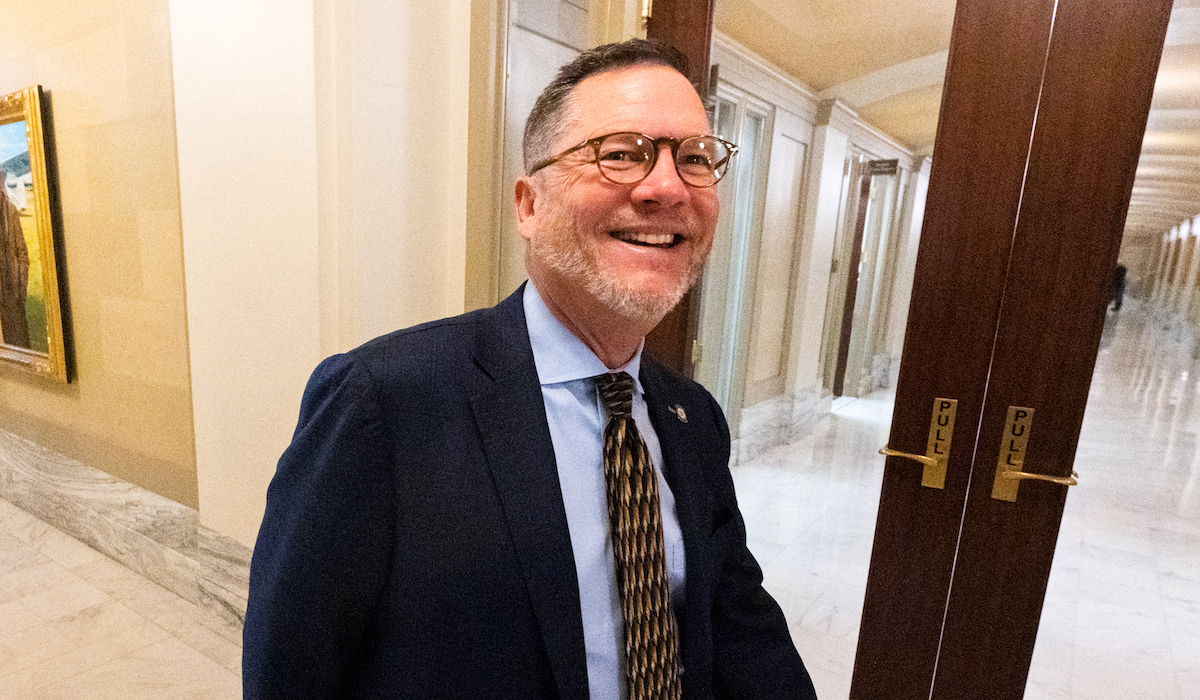
By February, however, legislators had grown confused about how and why the DPS radio upgrade project had been funded by the Broadband Office.
On Feb. 21, Fina texted Hall, the Senate Appropriations and Budget Committee’s vice chairman, that he had been quizzed by the Office of Management and Enterprise Services about the DPS project.
“They asked me a lot of questions about the DPS project that you had evidently asked them,” Fina said. “They were not familiar with the details and wanted to know more about it. I only went by what DPS requested. Is there something wrong with that project that I’m not aware of?”
Hall replied: “Yes. I have a problem with it.”
“Want to give me a call and explain,” Fina responded. “I thought is (sic) was all good.”
Hall responded saying that he wanted to meet, although he said a planned breakfast fell through and that he and Fina discussed the matter by phone.
“I felt like I had clear direction,” Fina told NonDoc. “They didn’t agree with that when we had conversations after the fact. There was some kind of communication confusion because I thought I did have direction. They seemed to think I didn’t.”
Fina: ‘It’s all on the up and up’
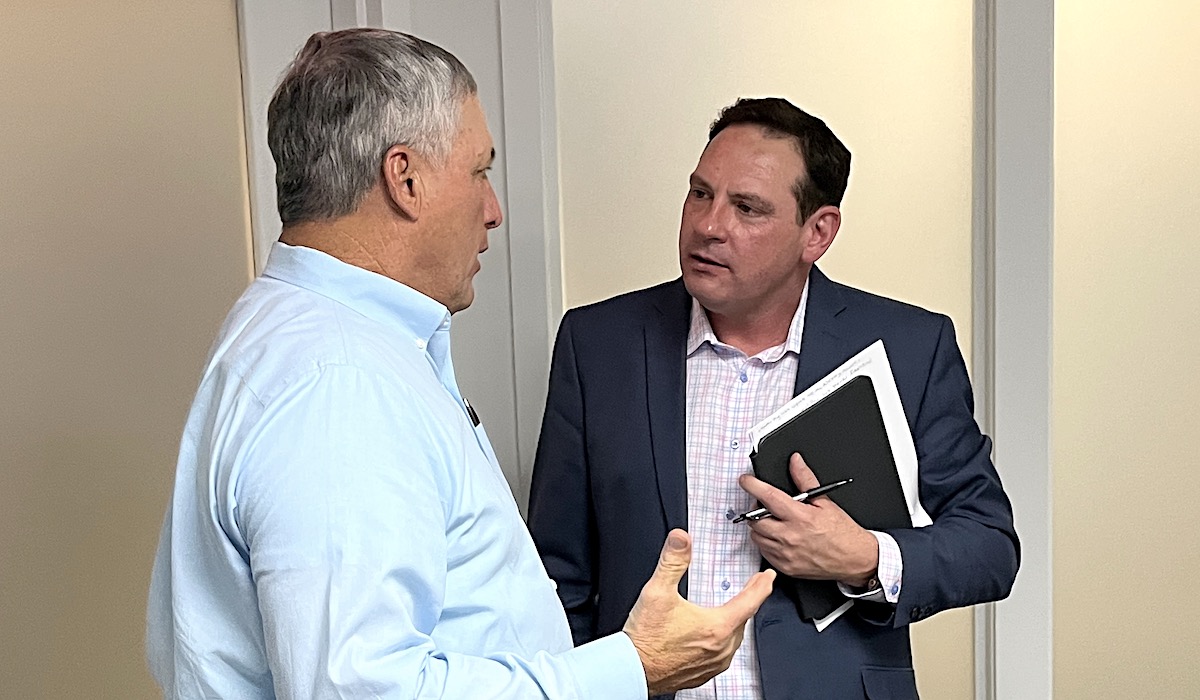
Fina, whose term on the Broadband Governing Board would have expired June 30, 2028, said he was given no reason for his removal when he received a call from the governor’s office June 13.
“I have no idea,” Fina said. “I did everything the governor asked me to do. I believe that I served him well on that board. So, I was probably the most shocked person as anyone to find out that he was removing me from the board.”
Sanders, who became executive director of the Broadband Office in late March, said he is unaware why the governor removed Fina from the board.
“That was the governor’s call,” Sanders said. “We all serve at the will of someone or some body.”
A former mayor of Piedmont from 2007 to 2011, Fina said he long has been concerned about the deficiencies of the state’s telecommunication system for first responders.
“That was something that I worked on when I was actually a mayor and (have been) involved with at OML,” Fina said. “That’s why it was a passionate thing for me. We’ve had this problem for over 20 years in this state — that particular deficiency in that radio system. I had worked on that a long time before Motorola came along trying to get those spots.”
Fina said he was not involved in the DPS and OMES process that selected Motorola to do the work.
“I didn’t have anything to do with the selection of Motorola,” he said. “DPS had already done the work and already selected Motorola for that project. I think what the Legislature was looking for was somewhere to fund it. I don’t know why they just didn’t fund it out of the ARPA funds. They said it didn’t qualify at first, but that was a bigger project that didn’t qualify.
“I was never consulted on a larger statewide network other than it being explained to me what the long-term plan was for the state. My concern was how does municipal government fit into that. But I really haven’t been part of those discussions. This has just been one piece of that larger project is my understanding.”
Even though he is friends with two Motorola representatives who have key interest in the OKWIN project, Fina said he never considered excusing himself from discussions involving the company.
“It’s been a project that I’ve been passionate about long before this group from Motorola was even introduced into the picture, so I probably didn’t give it a second thought because I’ve been working on this for quite a while, and it is just coincidence that Motorola happened to be the company,” Fina said. “It’s all on the up and up, and the board voted on it, so I really probably didn’t give it a second thought. I don’t think there was anything at all that on the surface of it that looked like it was inappropriate.”
Ford said he did not know about Fina’s relationship with the Motorola representatives, but he said it sends a wrong signal.
“That’s part of the problem. The state of Oklahoma has real close ties with Motorola, and I don’t like that,” he said. “My job as a legislator is to make sure that we get a statewide radio system — the best statewide radio system we can get for the best bang for our bucks — and that it’s a fair and transparent bidding process.”
Money approved by Broadband Board never reached DPS
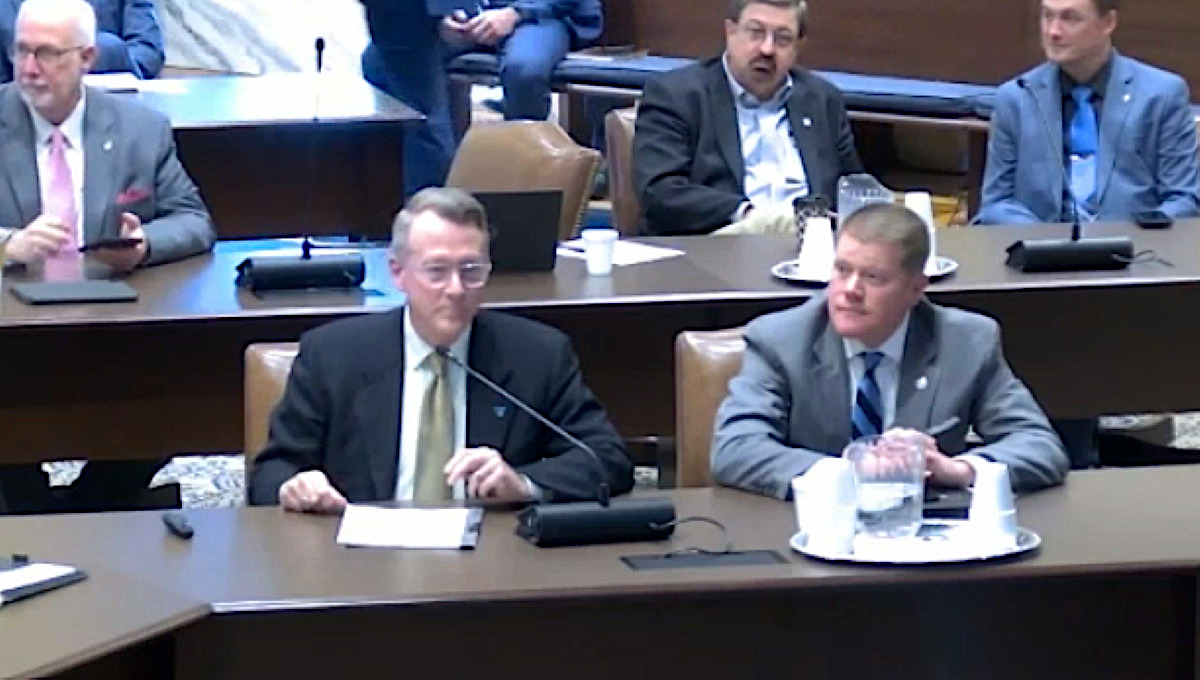
Despite all the starts and stops of the past seven months, the Oklahoma Broadband Office still has the $20 million of ARPA funds that had been designated for DPS, according to several people involved in the situation.
“No funds were ever spent from this office [on that project] using ARPA funds,” Sanders said.
Formed in the 1980s, OKWIN is a compilation of several independent systems across the state, consisting of DPS and several cities, including Tulsa, Shawnee, Edmond and Owasso, to form somewhat of a statewide public safety network. Previously, the cities had separate Motorola trunked systems.
Everest, the governor’s secretary of public safety, said she appreciates Thompson and House Appropriations and Budget Committee Chairman Kevin Wallace (R-Wellston) for finding a way to fund the DPS radio system upgrade through HB 1012X and the Legacy Capital Financing Fund.
“For the systems that we inherited at DPS today, it is the most cost effective and best use of taxpayer dollars to just update and upgrade the systems that are already on the towers, which happens to be Motorola,” she said.
Tim Allen, the Broadband Office’s communications director, said the $20 million of ARPA funds previously approved for the OKWIN project now will be available for distribution to actual broadband projects.
“We are committed to doing this very much in an open manner and doing it properly,” he said. “There will be no secret deals at the office.”
DPS: ‘We made no request’
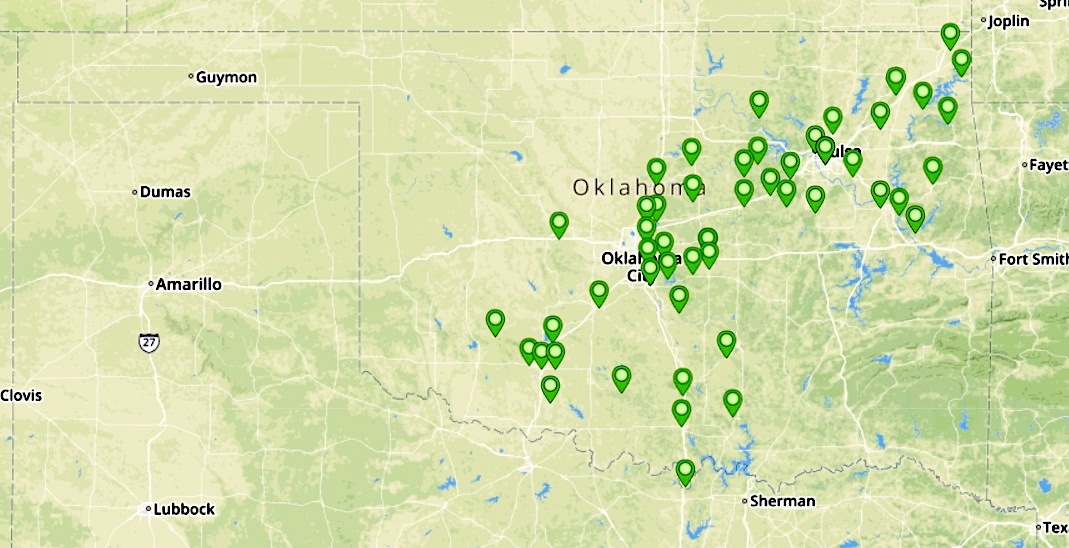
Despite widely articulating a need to upgrade the OKWIN system and filing an ARPA application with the Legislature, DPS officials have said they never asked the Oklahoma Broadband Office to provide the money.
Fina agreed with that assessment, saying DPS did not specifically request the money from the agency he oversaw. After a Broadband Governing Board meeting March 31, Fina told reporters that he saw the project on the state portal for relief funding proposals and legislators encouraged him to fund it, but he declined to provide names.
“I really don’t want to escalate this, so I prefer not to use any legislators’ names,” Fina said.
OKWIN radio site upgrades
• Big Cabin
• Coweta
• Grove
• Miami
• Pryor
• Carney
• Guthrie
• Preston
• Stillwater
• Ada
• Arbuckle
• Ardmore
• Lexington
• Tishomingo
• Baker Peak
• Chickasha
• Fletcher
• Geary
• Walters
Two days prior, during the March 29 meeting of the Joint Committee on Pandemic Relief Funding, lawmakers expressed confusion about why the Oklahoma Broadband Office sent DPS money that had been intended to expand high-speed internet access.
Martin, then the OBO’s interim director, told the committee that Fina had been encouraged to fund the project by “legislative leaders.” Neither Fina nor other Broadband Governing Board members were present at the meeting.
“Our board chairman talked to legislative leaders, and this was one project we were encouraged to consider,” Martin said.
Hall, a member of the joint committee, read from the bill authorizing the OBO and its mission of expanding access to broadband service, focusing on unserved and underserved Oklahomans. Hall said legislators who reviewed how ARPA funds should be spent had twice rejected the DPS OKWIN project, and he asked why Broadband Board members thought it was a proper use of ARPA funds.
“I don’t mean to dodge the question,” Martin replied. “I was not party to those conversations.”
Asked by Senate Minority Leader Kay Floyd (D-OKC) who decided to fund the project, Martin said it was the Broadband Governing Board’s decision.
“I think they looked at that as a communications issue more broadly than strictly a broadband issue,” he said.
Hilbert (R-Bristow) pressed Martin further about who asked the board to fund the DPS project.
“I am actually not clear on exactly the answer to the question,” Martin responded.
Spotting DPS legislative liaison Capt. Preston Lay in the room, Hilbert called him to the podium to address the joint committee. Hilbert asked Lay whether DPS made the request to the Broadband Office.
“We made no request,” Lay responded.
Lay said he had been told that legislators did not approve the use of ARPA funds for the OKWIN project but had heard in December that the DPS request had been taken up and approved by the Broadband Governing Board. Asked by Floyd who told him the OBO board had approved the OKWIN request, Lay replied that Fina called him to tell him of the board’s action.
Hall told NonDoc that he and Fina talked by telephone after the March 29 meeting, and he asked which legislators told Fina to use broadband money to pay for the OKWIN project’s Motorola upgrades.
“He said, ‘It came from you,'” Hall recalled. “And I said, ‘Mike, I have no idea what you’re talking about.'”
Hall said Fina referenced his Nov. 29 text — sent minutes after the conclusion of the board’s meting — when Hall responded, “Okay. Thx.”
“And I kept telling him, ‘Mike, if you’re telling people that somehow I directed you to do that — you were informing me that this was done after the fact.’ It makes no sense to me,” Hall said.
Hall said he knew DPS wanted funding to upgrade the OKWIN system, but he reiterated that the agency did not ask the Broadband Office to send over $20 million.
“In my conversations with DPS,” Hall said. “I believed them when they told me that they were surprised that they were asked to make a presentation to the Broadband [Governing Board], and they were even more surprised that an award was made following that presentation.”
Statewide communication system discussed for years
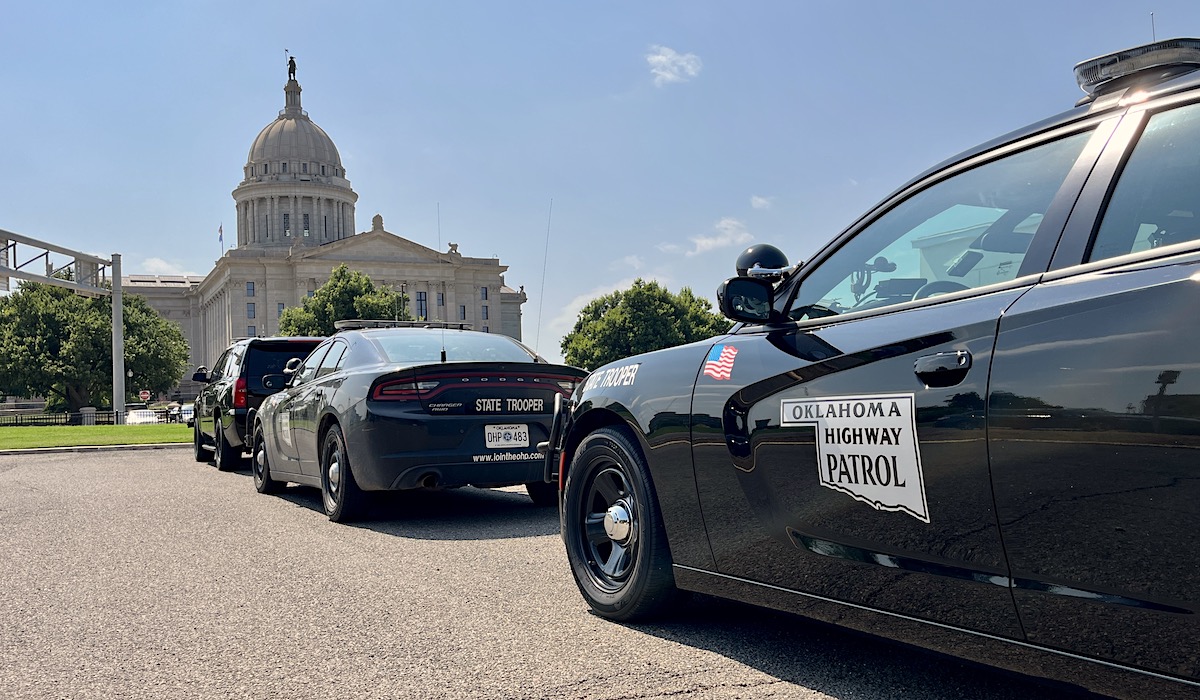
In 2020, Motorola, which has been a supplier of radio equipment for OKWIN for the past 20 years, received two contracts to upgrade parts of the OKWIN system, with Oklahoma using federal funds through the Coronavirus Aid, Relief, and Economic Security Act.
In September of that year, Motorola was awarded a $1.64 million contract from DPS to upgrade its radio systems in Elk City and Weatherford and provide equipment and hardware for a site in Sallisaw, even though the company’s was the highest of three bids. Stolz Telecom bid $1.47 million to provide equipment and services for all three sites, and L3Harris bid $990,000, with an option to include Sallisaw for a total of $1.12 million.
In November 2020, DPS and OMES awarded Motorola an $8.5 million contract to upgrade radio equipment in Oklahoma City and Lawton. L3Harris bid $5.9 million, which was 34 percent lower than the awarded bid. Stolz did not bid.
After that bid was awarded, Jason LaForge, a regional director of sales and account management for L3Harris, wrote a letter to Stitt expressing “very strong disappointment over the methodology still being used” by DPS in seeking bids for radio equipment.
“The perception is that the procurement practices above seemed to accelerate after the departure of the previous OKWIN director to a vendor, and the backfilling of his position with a person who worked for the same vendors (sic) preferred dealer partner,” LaForge wrote. “These position changes were a point of contention for the previous governor’s administration and the state legislative body. A sole source contract worth $50 million was stopped at attorney review for contract signing by [OMES.]”
In November 2015, OMES wrote to then-Rep. Jason Murphey, who had questioned the sole source contract sought by DPS for Motorola. Ben Gherezgiher, then the chief information officer for public safety and defense for OMES, said a working group of multi-agency representatives was being formed because OKWIN was outdated in technology and challenged in capacity and coverage. Due to the magnitude of the project, Gherezgiher said he anticipated the recommendation would be to acquire these services through competitive bids.
In his letter to Stitt five years later, LaForge said the technical reason L3Harris was told it did not receive either of the 2020 bids was the inability to automatically roam between different radio systems.
“The L3Harris technology can perform this function today, while the chosen vendor cannot,” LaForge wrote.
Asked by NonDoc if he received a response to his letter, LaForge said then-Deputy Secretary of Public Safety Jason Nelson contacted him immediately and a meeting was arranged with Secretary of Transportation Tim Gatz and Everest.
“They gave assurances that the state would go through a competitive process, and it would not happen again,” LaForge said.
Robert Stolz, president of Stolz Telecom, said a competitive bidding process helps ensure fairness.
“I always think from a taxpayers’ standing that the bidding process is the best way to go, however there has to be some safeguards in that bidding process to ensure that the bid requirements are fair and open and allow all bidders, whether it’s an incumbent bidder or a new bidder, to have a fair shot at providing what’s required in a bid,” he said.
Neither Cassard nor Lewis agreed to an interview for this article. Cassard said he would seek approval from his superiors within Motorola, but no comment was provided prior to publication.
Lay said he did not know if competitive bids were sought for the OKWIN project because that happened before he became involved.
“I’m not positive what the arrangements were made originally when all that started,” he said. “But where we’re at today, the issue that we have is that for interoperability, it needs to be Motorola equipment (…) since it’s a Motorola system. We’re not building new towers and erecting new towers with this money. This will just be simply replacing out-of-date or unserviceable equipment that are on the towers.”
Lay said he has heard there may be ways to allow interoperability between systems.
Ford, a former Tulsa police officer, said law enforcement leaders have talked about the need for an interoperable system since he began his career in 1984.
“We have never been able to get it done. It’s time now to get it done,” Ford said. “That’s part of the problem. Motorola says that it’s not capable of doing that, and it is. Broken Arrow and Tulsa — one’s on the Motorola system and one’s on Harris, and they can communicate back and forth. Arkansas has three different radio systems, and they’re all interoperable with each other. I guess our bids have not been worded properly to make that happen.”
Everest said current DPS leaders “inherited” a system that is not cost effective.
“We are agnostic as far as the company selected,” she said. “We just need the system. But at this point, from what I understand, it’s cost prohibitive to change towers or change systems so that they can operate together. (…) What I’ve been told is it’s cost prohibitive to use different systems that won’t integrate with the Motorola technology.”
Lay said DPS officials are looking into the capabilities of the OKWIN system and whether equipment and software are available to allow interoperability between Motorola and systems purchased by municipalities and counties from other companies.
“In an ideal world, we all need to be able to talk on the same radio or at least hear that traffic,” Lay said. “It just speeds up the process.”
Hall said he had told DPS leaders that he wanted to study and develop plans for a statewide law enforcement radio system “before we make a sizable investment in a communications system” for DPS.
“It just resonated with me that all of these law enforcement agencies should be able to communicate with each other,” he said.
Now, Hall said he still hopes discussions on a statewide communications system can actually occur, even after lawmakers approved the $20 million OKWIN upgrade this session.
“What I wanted was to seize the opportunity to bring DPS to the table and tell them, before we fund this, I want to have a talk about what a statewide system looks like,” he said. “I hope to resurrect the opportunity to talk about the value of a statewide system, and I believe everybody’s on board.”
Ford is the House author of SB 966, which would authorize the Land Mobile Radio Public Safety Interoperability Cooperative to create a statewide radio strategic plan. The bill passed unanimously in both chambers, but an amended version to correct an error failed to receive a final Senate hearing before the 2023 regular session adjourned. The Senate could take it up next year.
“I am fully committed to getting a statewide radio system and holding all the vendors accountable for their actions and making sure that it’s a clear, transparent, open bidding process,” Ford said. “Because what we have now is we’re not getting the best bang for our dollar.”













